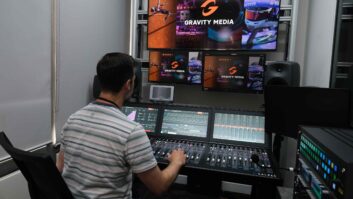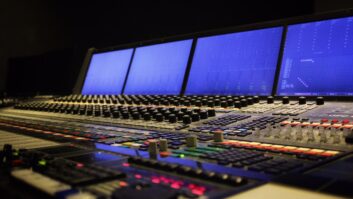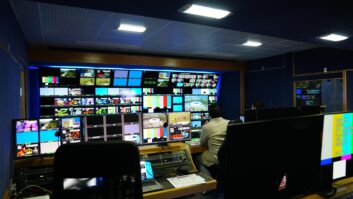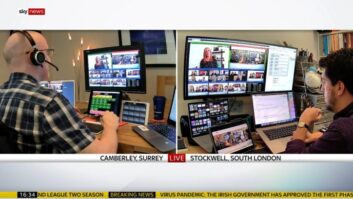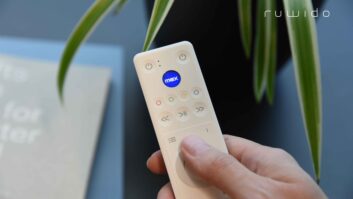Back in January, before football in England shut down for three months, dock10 and Arena Television trialled a remote gallery solution during the BBC’s coverage of the FA Cup. How prescient that now seems. As the FA Cup resumes, TVBEurope caught up with Andy Waters, head of studios at dock10 to find out more about the project.
He explains it was something the team at dock10 had been talking about internally for some time. Back then, they saw it as an opportunity to understand the arguments around sustainability. However, dock10 knew they couldn’t deliver a full proposition alone, and so an opportunity arose when Arena Television were visiting BBC Sport and asked if they could have a tour of the facility.
“I gave them a tour round the facility and I decided, perhaps it would be a good idea to raise the possibility of doing remote production with them,” continues Waters. “I was a little nervous, if I’m honest, because it did feel a bit like I was saying, ‘Hi it’s lovely to meet you, would you mind us taking a bit of your business from you? You doing less, and us taking a bit’. But when I summoned up the courage to ask them, they were very, very open to the idea, because Arena being the forward-looking company that they are see the importance of adopting this technology.
“They were instantly very engaged, and then an opportunity came up where the BBC suggested we do a trial, which we did in January, but very quickly. We had the target of doing the Manchester City against Fulham match at the end of January as a potential solution for this. But we thought, get the trial done first. So we did a trial from the Lawn Tennis Club. We set up a spoof OB – there was no sport there at all at the time, it was just done internally for dock10 and Arena. Then we invited BBC Sport over to get a feel for it. We thought ‘well, this is looking very promising, let’s see if we can target the Manchester City v Fulham match at the end of the January’. So, we set it up again to do a full trial from the Manchester City ground to absolutely test out the workflow, everything from autocue to scripts to EVS coverage to replays, obviously all the cameras and reverse vision feeds, a full test. We were so happy and satisfied with that, we said, ‘well let’s just do it for real on the Sunday’. So we went live on to BBC One on the Sunday afternoon, using HQ2 Gallery from MediaCityUK where the sports production team base themselves. We had a couple of Arena staff in our building, and obviously the Arena truck over at the Etihad Stadium.”

Going live to millions of football fans on BBC One on a Sunday lunchtime obviously meant the team had to put a lot of trust in the workflows. Of course, there was always a back-up in case things went wrong. Arena had a truck on site anyway, so that was used as the immediate back-up. “That wouldn’t be the normal plan of course because what would be the point if you’re going to be doing that all the time?” says Waters. “This was because it was a first and we absolutely appreciated there may be some unknown unknowns here which we might suddenly come across and could cause a problem. In addition to that backup, we had significant connectivity coming in from the truck via diverse routes. In order for us to deliver the remote gallery solution we had two five-gigabit fibres to the Man City ground. Both the fibre pairs went through diverse routes, but effectively via a tower, via London.”
The team chose to use the solution for the Manchester City game for a specific reason – it’s close to home. If things did begin to fall apart, the production team were only a short cab ride away from the ground. “I’m glad to say that wasn’t required.” says Waters. “It was important that nothing went wrong. And that was an extra layer of robustness.”
In terms of the technology used for the remote gallery, Waters is reluctant to give much away, “It was something which we worked with Arena on and I know they’ve invested quite heavily in it, and we’re making similar investments, and at the moment it’s not something which we’re in a position to talk too heavily about.”
dock10 plans to turn what they’ve learnt through the live trial with Arena Television into a “bookable solution” for any clients. “We want clients to be able to come and use this as a facility, rate-carded as a resource,” explains Waters. “And once again, we can team up with Arena or potentially other OB suppliers as required, to deliver this as a solution. I think we see it as part of our skillset to be able to deliver this sort of workflow. Different production companies need to use these technologies to satisfy different problems they encounter.”
Waters concludes by stating that connectivity is obviously essential for this kind of workflow. “We’re very lucky here at MediaCityUK, we’ve got 25 different connectivity providers, all landing on our network. So not only do we have a huge amount of connectivity coming in, we’ve got a choice of connectivity providers. We can go to the market and get different quotes from different suppliers. And, depending on bandwidth they have available at the time, or other connectivity which they have beyond MediaCity, there may be one supplier which is really better placed to offer the connectivity services than another. So having 25 of them all landing on our network puts us in a great position.”


